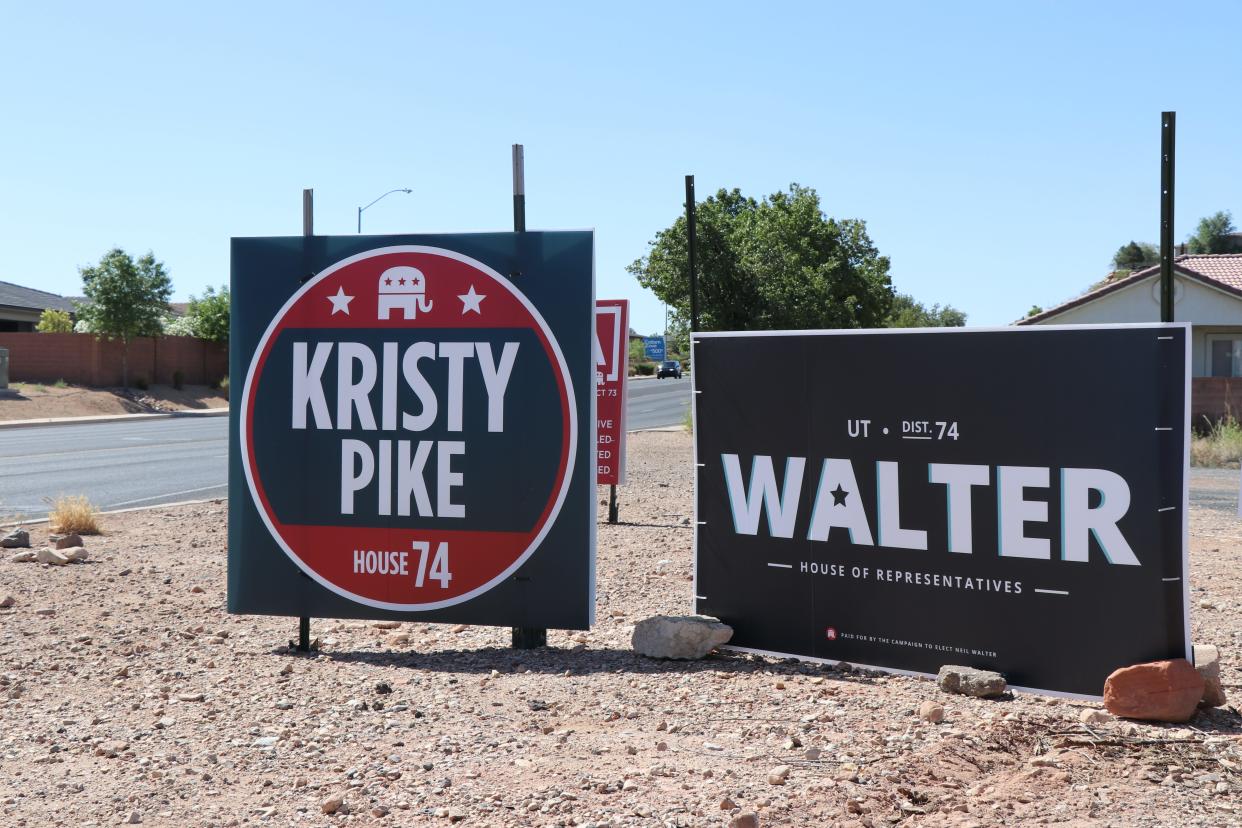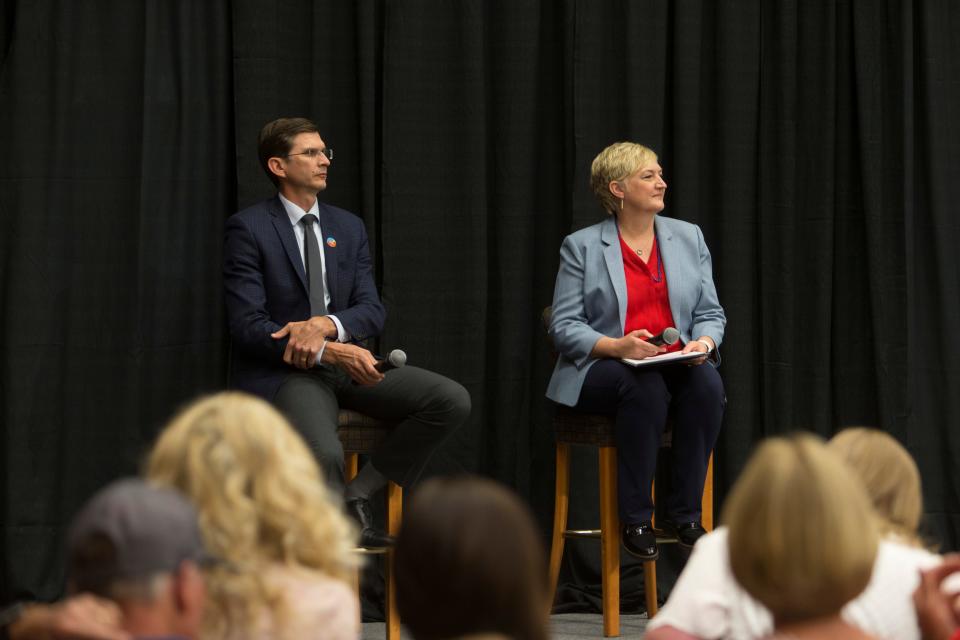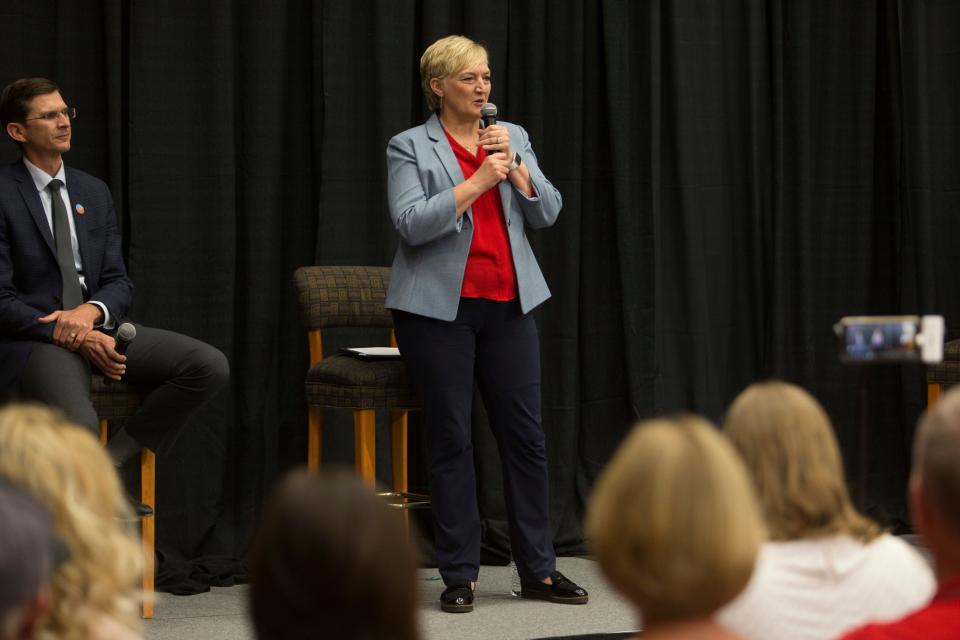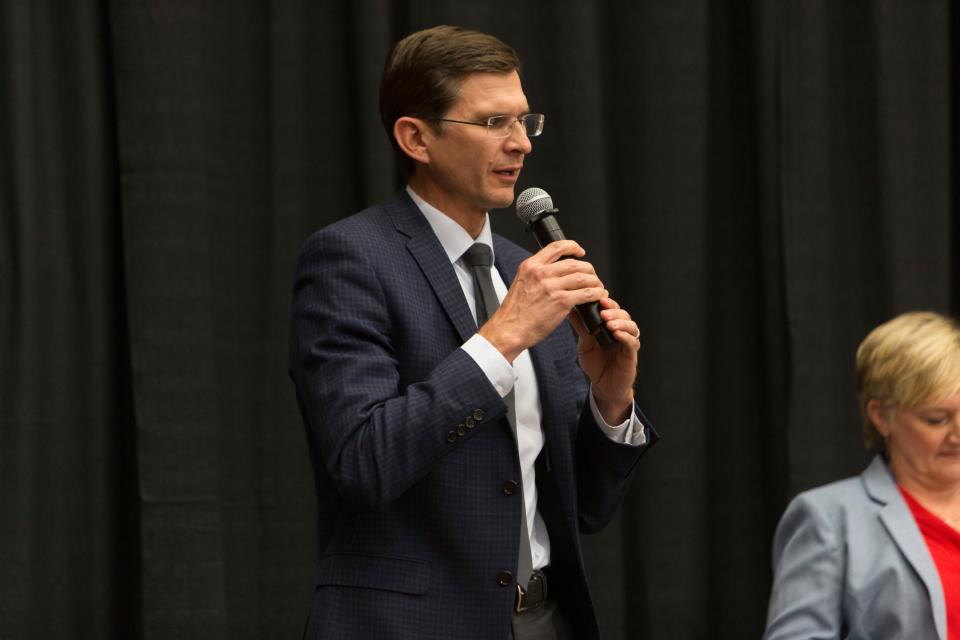2022 primary election Q&A: GOP candidates for House District 74, Kristy Pike and Neil Walter

The election to find the Republican nominee in the race to replace outgoing Utah Rep. Lowry Snow is between Kristy Pike and Neil Walter, two people with deep ties to the Washington County community.
Walter is the CEO of ERA Brokers, which has an office in downtown St. George, while Pike is the director of the Washington County Children Justice Center and is married to former St. George Mayor Jon Pike.
Initially, the field for this seat included five Republicans and no one else, with the GOP's side narrowed to two after the party's county convention, where Walter got just under 74% of the delegate vote. Pike didn't make it to the final round of voting at the convention but collected signatures to secure her place on the primary ballot.

Dig deeper: Republican primary debates feature new faces, discussions on water, growth and education
The two candidates are seeking to replace Snow, who announced last year he was resigning his seat in the Legislature after 10 years in office. The winner would be the Republican nominee to take over the 74th District, which was redrawn after the 2020 census but remained similar to its past form, covering Santa Clara, Ivins, parts of St. George and other areas on the west side of Washington County.
The Spectrum sent both candidates a questionnaire to gauge their positions on key issues that impact southwest Utah. Here are their responses:
Water continues to be a scrutinized resource during this ongoing drought. What would you do as an elected official to protect this resource in the future?
Pike: Historically water has always been the top issue here in Washington County. Our history is the history of finding, channeling, conserving, storing, and praying for water. If we look back at that history, we learn some important things that will serve us well in our current situation:
We need to be very, very careful with the water we have! Our former governor gave us a conservation goal, and we beat it. But there’s more we can do. Our cities, towns, and county are working with residents to conserve and to have guidelines in place for new development that encourage desert landscaping. Our homebuilders are coming to the table. Our residents are coming to the table. We’re going to need to continued to do more with conservation.
We need to store more water. Last year the legislature appropriated 15 million that will allow the Graveyard Wash reservoir to be built, capturing secondary water that would otherwise be lost. That’s great, but the legislature also appropriated about 400 million for water projects on the Wasatch Front. I will be a strong voice within the “Sunshine Caucus” to advocate for additional water infrastructure funding.
Walter: Protecting our water is critical for our community. I would work to ensure there is ongoing support for the water projects that are underway and planned. I would continue to support projects impacting Washington County that required state participation. In addition, I would encourage the current efforts to implement reuse systems. We will continue to improve our efficiency as our water management experience, technology, and resources improve. We will have to be intentional in our efforts to identify water projects and fund them. Finally, we will need to ensure that we don’t give up or lose local or state water rights to downstream users who have been consuming more than their share of the available water.
What needs to happen for Washington County if the Lake Powell Pipeline isn’t built?
Pike: When you live in the desert, you can never stop looking for and developing water resources. We can’t give up on the Lake Powell Pipeline, but we need to simultaneously continue to identify and pursue every other source of water. With low-hanging fruit gone, developing future water resources will come with a significant price tag. One such option could be treating the Pah Tempe Hot Springs, which our water district owns.

Walter: If the Lake Powell Pipeline is not built, we will have to look at alternative sources of water supply and development to meet needs. The cost of these water sources will be even more expensive to develop per acre foot and will be more challenging to secure. The only thing more expensive than developing new water sources is a moratorium on new units. In the event of a moratorium, we will realize the an even higher costs in the form of rising home values. Home values have increased aggressively over the past few years. If we don’t secure adequate water sources for the future, then home prices will rise even faster and affordability will be even more challenging than it already is.
What are the most pressing issues for you for this election?
Pike: Water, affordability of housing, growth, education, and diversifying our economy are all top concerns. We need to be planning strategically for the long-term future while urgently working to ensure that living and working in Washington County can be an attractive, attainable option for our children and grandchildren.
In addition, my life experience and work at the Children’s Justice Center make me well qualified to tackle other significant issues at the legislature. Our law enforcement and first responders deserve a champion who will work to ensure they have the pay, retirement benefits, and mental healthcare they need to take care of themselves and their families.
2022 Primary Election: Q&A with Washington County candidates Gil Almquist and Allen Davis
Our youth (and adults) are struggling with mental health crises that also affect physical health and the wellbeing of our communities. Here in Washington County we are working on ways to assess mental health trauma in children and provide resources to buffer the lifelong effects of adverse childhood experiences. This is work that should have statewide application.
Walter: The most pressing issues are the importance of Southern Utah having an independent voice at the Legislature, parents’ concerns being heard as it relates to education and health, and standing up for Utah’s Dixie. Washington County only has 4 of the 75 seats in the Utah House of Representatives. Southern Utah's representation should represent Southern Utah's interests.
Families are concerned about trends in education that dismiss parents. There is strong opposition to ideologies that label our children, ignore parent input, and attempt to create distance between parents and children. CRT and its related concepts are an example. Parents are concerned about their ability to make health decisions for themselves and their children. Ensuring that individuals have the right to make those health decisions and are not imposed on by the government is a significant concern in Washington County.
While the University is moving forward with its Utah Tech image and strategic vision, I will do all that I can to protect the "D" on the hill, "Dixie" on the Sugarloaf, Dixie Tech, Dixie High School and the many businesses, organizations, places, and people who carry the name Dixie.
I am hopeful about our future and feel optimistic about our community.
How should nature conservation play into the development of southwest Utah?
Pike: Everyday I try to take a few minutes to enjoy this beautiful place that we get to call home. The natural wonders that surround us are more than just a breathtaking backdrop for our communities; our health and wellbeing are inextricably connected to the health and wellbeing of our natural surroundings. No one understands that better than we do locally.
About 63% of Utah’s land is managed by federal agencies. Less than a quarter of our land is privately owned. I appreciate the forethought shown in the Utah Resource Management Plan that supports the wise use, conservation, and protection of public lands and their resources. The plan seeks to balance public lands management and work collaboratively with federal agencies. I support this approach.

Walter: Utah is fortunate to have public lands. The vast majority of residents and visitors treat the lands with respect. Unfortunately, some are thoughtless and destructive. It is important that we continue to take care of our public lands and help residents and visitors have a great experience in one of the most beautiful communities in the world. As our community grows in population and continues to see record numbers of visitors, there will be more impact unless we are intentional in our approach. We can preserve the quality of our open space, state parks, BLM, Forest Service, Wilderness, and National Parks. We must in order to maintain our quality of life and the beautiful surroundings.
Do you support the Northern Corridor being built through the Red Cliffs Conservation Area?
Pike: Washington County needs the Northern Corridor. Without it, downtown St. George will become gridlocked, adding to area air pollution and decreasing our quality of life. The Trump Administration approved a Northern Corridor deal where the State gets to build the 4-mile road, and Washington County agreed to add 6,800 acres to the Red Cliffs Desert Reserve. This new reserve land is west of my neighborhood in Bloomington and appears to be excellent tortoise habitat. The collaboration and compromise that brought about the Northern Corridor deal is excellent for county residents and visitors because we absolutely need a northern road that allows people to bypass an increasingly busy downtown St. George, and the newly protected land is in an area that we are happy to keep as open space. It’s good for tortoise recovery efforts because more tortoises will be helped than harmed in the deal.
Walter: Yes. The construction of the Northern Corridor will improve traffic congestion in the community and can be built while managing the impact to the Red Cliffs Conservation Area. Some may worry that building the Northern Corridor will open the area up to development similar to the way the Southern Corridor has accelerated growth. The lands around the Northern Corridor are owned by the federal government and are in sensitive areas. The area around the Southern Corridor are primarily state or private lands and were planned for development. For this reason, the Northern Corridor can be helpful in reducing traffic congestion while minimally impacting the Conservation area.
What does ‘smart growth’ look like to you?
Pike:
About 15 years ago, stakeholders in Washington County got together and created Vision Dixie. The principles of Vision Dixie are as applicable today as they were then:
Plan regionally, implement locally
Maintain air and water quality and conserve water
Guard our “signature” scenic landscapes
Provide rich, connected natural recreation and open space
Build a balanced transportation system
Focus on walkable communities with mixed-use centers
Direct growth inward
Provide a broad range of housing types
Reserve key areas for industry
Focused public land conversion should sustain community goals and preserve critical lands
Walter: Smart growth is planning for the future with a perspective for future limitations, innovations, and trends. Washington County is growing because it is a beautiful, friendly place with an attractive climate. More people are discovering Utah’s Dixie every year. As the Wasatch Front grows, more people are looking to this place to visit and play. For these reasons, demand is very strong over the long run. Although our limited water, land, and resources will constrain growth, a no growth policy will penalize our youth and young families more than anyone. In order for this to remain a family friendly place and avoid becoming a resort, we will have to accommodate future growth.
There are ideas that we haven’t seen or thought of that may help provide solutions to our challenges. Innovations in water consumption, reuse, and development may adjust our plans in the future. Innovations in building technology or materials may lower cost or increase quality. Current trends increasing density may reduce community impact per unit. As we look to the future, we need to be thinking about how we can adapt and evolve our planning to accommodate changing resource limitations, new innovation, and changing preferences of local residents and visitors.
How would you describe yourself politically?
Pike: I am a mainstream Republican. My political mission statement echoes that of the Utah GOP: I appreciate the productivity of our citizens, affirm the infinite worth of all individuals, and seek the best possible quality of life for all.
Walter: I am a conservative. Following are three examples that best describe my approach and values.
Lincoln, the first Republican president, was an emancipator who fought for equality for all Americans. He was the original civil rights advocate. As a Republican, I am honored to be associated with his legacy.
Ronald Reagan was a conservative Republican who was a great uniter. He brought our country together and reversed the taxes and overbearing regulation of the Great Society, realigned Republicans with conservative principles, ended the cold war, and returned the United States to a course of economic prosperity. As a Republican, I am honored to be associated with his legacy.
Lesser known but also impactful was Calvin Coolidge, the 30th President, was also a Republican and a principled conservative. He was for fiscal responsibility, hard work, limited government, thrift, stability, and normalcy. Just what we need today. Coolidge presided over a period of prosperity that followed punitive taxes and high inflation resulting from World War I and the ravages of the Spanish Flu. Coolidge lowered taxes, shrunk the size of government, improved the credit and standing of the United States, paid down the federal debt, and returned a pandemic weary country to normalcy.
What could Republicans in Utah be doing better?
Pike: The world has been rocked over the past couple of years by threats – some of them real, some of them perceived, and some of them manufactured by hate mongers who benefit financially by creating crises where there are none. When people are threatened, we do one of three things: we fight, we flee, or we freeze. That’s how we have survived as a species, and that is where we have been for the past two years. But to thrive as humanity, we need to move out of survival mode. We all need to again begin to envision a healthy future and make plans to work towards it. We need to embrace the art of listening and collaborate on important issues. We need to remember the things we have in common, and remember how to work together. Here in southern Utah, working together is in our DNA. We need to honor those roots.
Walter: Republicans could be better at sharing our vision and our principles. We believe in our founding principles and that they will bring security and prosperity in the future.
The Declaration of Independence says, “We hold these truths to be self-evident, that all men are created equal, that they are endowed by their Creator with certain unalienable Rights, that among these are Life, Liberty and the pursuit of Happiness.” The Republican Party was founded in opposition to slavery with the purpose of making this truth a reality. Abraham Lincoln was the first Republican president.
2022 Primary Election Q&A: Chris Stewart and Erin Rider, candidates for Utah's 2nd District
Republicans believe in protecting the freedoms of all Americans. We support law enforcement, military, the rule of law, and the right to life. Republicans believe government should serve the people, it should be restrained, and taxes should be low. Republicans believe in education and opportunity, protecting the environment, legal immigration, and religious freedom.
Finally, Republicans are for family.
Should the government be doing more to create affordable housing? (Yes or No) What steps would you take around housing affordability if you are elected?
Pike: It is not the role of government to “create” affordable housing. With limited exceptions, government does not build housing. Government does not set the price of land or materials or labor. What government can do is bring together the stakeholders who do create housing, encourage social responsibility, ensure that government is not part of the problem that is driving up pricing, and act in a way that will promote the wellbeing of citizens. In locations where the state has invested in transportation infrastructure, such as interchanges, highways, and transit, I support working closely with cities to continue to develop affordable housing options. In some cases, the state may be able to assist by contributing state-owned property in such locations to aid in the development of housing.
Walter: No. The old saying, “less is more” applies in this case. The more we try to make housing affordable, the less affordable housing is. In the long run, the only way to make housing more affordable is to decrease demand or increase supply.
Decreasing demand means you have to make our community undesirable. I don’t believe we should ruin our quality of life here. We could choose to do less promotion and hold fewer events, but the largest group of people coming to our community are not from outside, they are from the Wasatch Front. They will keep coming for good weather, outdoor recreation, and stunning scenery.
Increasing supply is difficult. Water, labor, and materials are becoming more expensive. Land is becoming more expensive. Municipal approval takes time and the cities are incurring more cost to deliver services. We need to have clear guidelines and simple policies.
For decades, we have been trying to attract higher paying jobs, so people would be able to afford a higher cost of living. While this is a valuable effort, it doesn’t make housing more affordable. Our best option is to do everything we can to create simplicity and transparency around housing. Anything else contributes to rising home prices.
THANK YOU: Subscribers' support makes this work possible. Help us share the knowledge by buying a gift subscription.
DOWNLOAD THE APP: Get the latest news, sports and more
Sean Hemmersmeier covers local government, growth and development in Southwestern Utah. Follow on Twitter @seanhemmers34. Our work depends on subscribers so if you want more coverage on these issues you can subscribe here: http://www.thespectrum.com/subscribe.
This article originally appeared on St. George Spectrum & Daily News: Utah 2022 primary results: Q&A with GOP House District 74 candidates

